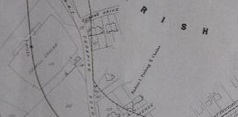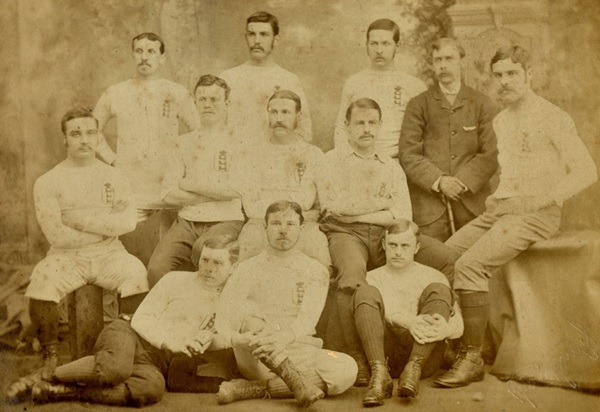 England
Football Online England
Football Online |
|
|
Page Last Updated 6 May 2024 |
Alba |
|
|
previous match
(343 days)
9 vs. Scotland
 |
10 |
 |
next match
(two days)
11 vs.
Wales
13 vs.
Scotland
|
Saturday,
13 March 1880
Association Friendly Match
Scotland 5 England 4
[3-2]
|
.jpg)  |
 |
Hampden Park, Hampden Terrace,
Prospect Hill, Glasgow,
Lanarkshire
Kick-off
(London Time): "The teams
entered the enclosure at 3.30p.m."
Attendance: 'It being computed
that 9,000 passed the gates.';
'over 12,000 spectators
were present.";
'in presence of over fifteen
thousand spectators.";
"no less
than 15,000 people being present.'; 'variously estimated at 15,000.';
'It is computed that between 15,000 and 16,000
persons...';
'...before a
concourse of 20,000 people." |
|
England's second visit to Hampden Park, but fifth to Glasgow, to Lanarkshire and to Scotland |
|
 |
Geordie Kerr
kicked-off
Glasgow Herald states Campbell did so |
Charles Wollaston
won the toss |
 |
[1-0]
Geordie Kerr
5
'hard,
low, shot' from a corner
| England's second ever
equalising goal> |
[2-1] John Baird 41
dodged the keeper as a result of
Smith run
| England's third ever
equalising goal> |
[3-2] Geordie Kerr 44
send
the leather between the posts |
[1≡1]
Billy Mosforth
6
'smart shot'
[2≡2] Charlie Bambridge
42
'clever low shot'
from a Bastard pass
|
[4-2] Geordie Kerr
48-51 HAT-TRICK
[5-2] Johnny Kay
70
claim for offside
were dismissed
|
Charles Campbell injured -
ten men 75 |
|
[5-3]
Francis Sparks 85
'hard-in, off the post'
[5-4] Charlie
Bambridge 88-89
BRACE
'parting-kick' |
|
Glasgow Herald and The Sportsman state the first goal came after
15 min and the equaliser two min after |
|
"Bright, warm spring day with a slight wind,
following a day of heavy rain;" |
Played according
to SFA rules. |
|
|
|
|
flg.jpg)  Match
Summary Match
Summary |
|
Officials
[umpires and referees are of equal relevance] |
Scotland |
Team Records |
England Party |
|
Umpires
|
|
James Nicholson
Vale of Leven FC,
Dumbartonshire
(SFA committee member) |
William Pierce
Dix
26 (winter 1853)
Eccleshall, Sheffield
(Sheffield FA Hon.
secretary)
|
Referee
Captain Donald Hamilton
34 (6
April 1845), Kilmory, Bute (SFA vice-President) |
|
|
|
 Scotland
Team Scotland
Team |
| |
|
Rank |
No official ranking system established;
ELO rating
1st |
Colours |
Dark
blue shirts, white shorts. |
|
Captain |
Robert Neill |
Selection |
Following two trial matches in the previous
fortnight, The Scottish Football Association
Selection Committee |
|
P last of 2, W 2 - D 0 - L 0 - F 14 - A 4. |
|
|
team chosen in Glasgow, on Saturday evening, 6 March 1880. |
 Scotland
Lineup Scotland
Lineup |
|
49 |
|
Rowan, Archibald |
24
161 days |
4 October 1855 |
G |
Glasgow Caledonian FC |
1 |
4ᵍᵃ |
|
|
Neill, Robert Walker |
26
222 days |
4
August 1853 |
Back |
Queen's Park FC |
5 |
0 |
|
final app
1876-80 |
|
|
McLintock, Alexander |
26/27 |
1853 |
Vale of Leven FC |
3 |
0 |
|
final app
1875-80 |
|
|
Campbell, Charles, injured off (broken
jaw) 75th min. |
26
53 days |
20 January 1854 |
Half
Back |
Queen's Park FC |
7 |
1 |
|
|
McPherson, John Campbell McLeod |
24/25 |
1854 |
Vale of Leven FC |
3 |
0 |
|
|
Smith, Dr. John |
23
1 day |
12 March 1857 |
For |
Mauchline FC |
5 |
1 |
|
will referee the 1892 fixture |
|
|
McNiel, Moses McLay |
24
136 days |
29 October 1855 |
Rangers FC |
2 |
0 |
|
final app
1876-80 |
|
50 |
   |
Kerr,
George |
20
16 days |
26 February 1860 |
Queen's Park FC |
1 |
3 |
|
the second hat-trick against England |
|
|
McGregor, John Cunningham |
29
22 days |
20 February 1851 |
Vale of Leven FC |
4 |
1 |
|
final app
1877-80 |
 |
Baird, John Campbell |
23
230 days |
27 July 1856 |
Vale of Leven FC |
3 |
2 |
|
final app
1876-80 |
|
51 |
 |
Kay, John Leck |
22
189 day |
6 September 1857 |
Queen's Park FC |
1 |
1 |
|
reserves: |
back/half-back; David Davidson (Queen's Park FC); forward:- James Douglas
(Renfrew FC) |
|
team notes: |
Charles Campbell had his jaw-bone seriously
bruised in the last 20-15 minutes. Leaving Scotland with one player short.
George Kerr
is often found as Ker in history books -
but definitely baptised a Kerr in Govan. He is the younger brother of
William,
who played for Scotland in the first two fixtures.
As Queen's
Park FC players, Kerr, Robert Neill, Charles Campbell and Johnny Kay,
were all playing on their home ground. |
|
|
|
2-2-6 |
Rowan -
Neill, McLintock -
Campbell, McPherson -
Smith, McNiel, Kerr, McGregor,
Baird, Kay. |
|
Averages: |
Age |
24 years 239-306 days |
Appearances/Goals |
3.2 |
0.8 |
|
|
|
flg.jpg) England
Team England
Team |
| |
|
Rank |
No official ranking system established;
ELO rating
2nd |
Colours |
White
crew necked shirts with the English Arms in black on the breast, dark shorts and dark blue caps.
With the
exception of Norman Bailey, who wore a collared jersey |
|
Captain |
Charles Wollaston |
Selection |
Following
two trial matches,
The Football Association Committee with secretary Charles W.
Alcock having the primary influence |
|
only match, W 0 - D 0 - L 1 - F 4 - A 5. |
P 10 of 31, W 3 - D 2 - L 5 - F 21 - A 29. |
|
eighth player to captain England |
team chosen at The Oval, on Saturday, 6 March 1880 |
flg.jpg) England
Lineup England
Lineup
(a new record low seven changes to the previous match) |
|
11 |
|
Swepstone, H.
Albemarle |
21
59 days |
14 January 1859 |
G |
Pilgrims FC |
1 |
5ᵍᵃ |
|
70 |
oldest youngest player so far |
|
71 |
|
Luntley, Edwin |
22
320 days |
28 April 1857 |
RB |
Nottingham Forest FC |
1 |
0 |
|
72 |
|
Brindle, William |
26
294 days |
24 May 1853 |
LB |
Darwen FC |
1 |
0 |
|
|
Bailey, Norman C. |
22
234 days |
23 July 1857 |
Half
Back |
Old Westminsters AFC
&
Clapham Rovers FC |
4 |
0 |
|
|
Hunter,
John |
28
213 days |
13 August 1851 |
Heeley FC &
Providence FC |
2 |
0 |
|
73 |
 |
Bastard, Segar R. |
26
48 days |
25 January 1854 |
OR |
Upton Park FC |
1 |
0 |
|
refereed the England-Wales fixture in 1879,
will umpire in 2 days
&
referee again in 1881
& 1882 |
only app 1880 |
|
|
Wollaston, Charles H.R. |
30
226 days |
31 July 1849 |
IR |
Wanderers
FC, Lancing Old Boys
AFC &
Clapham Rovers FC |
4 |
1 |
|
was an umpire in 1879
& will be in 1885 |
the last Wanderer to represent England |
final app 1874-80 |
 |
Sparks, Francis J. |
24
253 days |
4 July 1855 |
Centre
Forward |
Hertfordshire Rangers FC &
Clapham Rovers FC |
2 |
1 |
|
74 |
|
Widdowson, Sam W. |
28
332 days |
16 April 1851 |
Nottingham Forest FC |
1 |
0 |
|
only app 1880 |
  |
Bambridge,
E. Charles |
21
227 days |
30 July 1858 |
IL |
Swifts FC |
2 |
4 |
|
scorer of England's third brace |
most
gls |
 |
Mosforth,
William |
22
71 days |
2 January 1858 |
OL |
Sheffield Albion
FC |
5 |
2 |
|
=mst aps |
|
reserves: |
Charles Learoyd (Royal Engineers FC),
Tom Marshall (Darwen FC) |
|
team changes: |
The original team line-up included
Old Etonians
AFC's back
Lindsay Bury, his place went to Brindle.
Charlie Bambridge's
brother,
Ernest, played for England in 1876. |
|
appearance
notes: |
Charles Wollaston and Norman Bailey are the fourth and fifth players
to have made four England appearances.
Billy Mosforth is the first
player to make five consecutive England appearances.
Albemarle Swepstone
is the youngest player of the eleven starting the match, thus breaking
a record set in 1876 by Beaumont Jarrett, by 194 days. Swepstone will
be the oldest youngest player until 1884. |
|
goalscoring
records: |
The third time England have scored four or more goals, but the first
time they have been defeated.
Charlie Bambridge becomes the first
player to score two goals in a single match in two separate matches,
as well as becoming England's top goalscorer at this venue.
Billy
Mosforth and then Bambridge are the first and second England
players to score in consecutive matches, in so doing, become the first
players to score in two different matches. Mosforth also
becomes the most experienced
England player to score a goal.
Of the 21 goals England have now
scored, three have been equalising goals. Mosforth is the first
English player to score an equaliser, and in this match, the first
time England have scored two. |
|
|
|
2-2-6 |
Swepstone -
Luntley, Brindle -
Bailey, Hunter -
Bastard, Wollaston, Sparks, Widdowson,
Bambridge, Mosforth. |
|
Averages: |
Age |
25 years 41 days |
Appearances/Goals |
1.8 |
0.2 |
|
oldest starting XI
until 1892 |
=most experienced team
until next match |
|
"The
players afterwards dined together at the Grand Hotel." - The
Times, Monday, 15 March |
|
|
|
England previous teams
vs. Scotland: |
|
1879: |
Birkett |
Christian |
Morse |
Prinsep |
Bailey |
Hills |
Goodyer |
Wace |
Sparks |
Bambridge |
Mosforth |
|
1880: |
Swepstone |
Luntley |
Brindle |
Bailey |
Hunter |
Bastard |
Wollaston |
Sparks |
Widdowson |
|
|
|
|
Match Report
The Times, Monday,
15 March 1880 |
|
Saturday last
was the day appointed for the ninth annual match between England and
Scotland according to Association rules. The heavy rain which fell in
Glasgow on Friday caused many fears lest it should continue on the
following day. Fortunately, however, these were not realised, as the
weather was gloriously fine, and over 12,000 spectators were present
at Hampden-park. Scotland set the ball rolling against the wind; but
it was soon returned by the English forwards, and a shot at goal was
made by them, but the ball went about half a yard the wrong side of
the post...
The game had
lasted about a quarter of an hour before anything of a definite
character was secured. Ker then got in possession of the ball, and
placed the first goal to the credit of Scotland. This thoroughly
called forth the enthusiasm of the large number of people present, but
their cause for exultation was short-lived, as Mosforth quickly shot
the ball through for the Southerners, it having been well passed to
him by Bambridge. For some little time after this the English kept the
play in close proximity to their rivals' posts, causing the
goal-keeper some anxiety. A claim of "hands," however, was given in
favour of Scotland who, thus aided, drove their assailants back and
carried the warfare into England's domains when, despite the activity
of Swepstone, Baird kicked a second goal for his side. The visitors,
however, were bent on not leaving them long in possession of this
advantage, and Bambridge, who kept well on the ball throughout, got
another goal for England. The score having been thus equalized for a
second time the contest became keener than ever, and a few minutes
before half-time Ker kicked a third goal for Scotland. Ends had
changed, and the ball had not long been restarted, before Ker obtained
a fourth goal. Level play ensued, but the home team again asserted
their superiority, and Kay once more sent the ball between the posts.
An accident to Campbell now caused his retirement, and the English
played up in a style which soon threatened to take the victory out of
the hands of their opponents. The ball was taken in front of the home
team's fortress, and out of a loose scrimmage, it was shot under the
cross-bar. Thus encouraged, England continued to press their rivals,
and within three minutes of the last success Bambridge gained a
fourth...
The teams were
very evenly matched in both weight and skill, and although the ground
was rather heavy, the play was pretty fast. The players afterwards
dined together at the Grand Hotel.
|
|
|
In Other News....
|
It was on 13 March 1880
that the Leader of the Opposition, Lord Hartington was a calming influence
as he addressed thousands of people in a weaving shed in Accrington at the
beginning of the Liberal party's ultimately successful election campaign. |
|
In the seventh
annual universities match at Kennington Oval, Oxford were the favourites,
but suffered a third successive defeat to Cambridge, by 3-1, despite taking
an early lead; Cambridge thus completing the first hat-trick of victories. |
|
|
|
|
Source Notes |
original newspaper reports
Scottish Football Association
Cris Freddi's England Football Factbook
Andy Mitchell's extensive research |
|
The Football Association Yearbook
James Corbett's England Expects
John Treleven
Scottish Football
Museum |
|
|
cgi |


.jpg)

